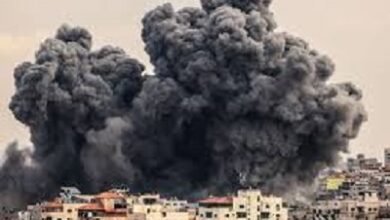Israeli officials have emphasized the need to respond to the Iranian drone and missile attack
S K Singh:Editor-In-Chief

Israeli :- Israeli officials have emphasized the need to respond to the Iranian drone and missile attack but have not specified how or when they will do so. An unnamed US official told Axios that Israeli Defense Minister Yoav Gallant told US Defense Secretary Lloyd Austin in a phone call on April 15 that Israel has “no choice” but to respond to the Iranian attack. Gallant stated that Israel will not allow ballistic missiles to be launched against its territory without a response. An unnamed Israeli official told NBC News that Israel’s response may be “imminent” following an Israeli war cabinet meeting on April 15. The official added that any Israeli response will be coordinated with the United States.
Western and Israeli officials have maintained that the Iranian drone and missile attack into Israel on April 13 was meant to impose a severe cost on Israel—rather than the attack being symbolic and meant to fail. US National Security Council spokesperson John Kirby stated on April 15 that Iran sought to cause “extensive damage inside Israel” but failed due to US, Israeli, and partner efforts to intercept the Iranian projectiles. Kirby’s remarks are consistent with other unnamed senior Biden administration officials telling Western media that Iran intended for the attack to cause “significant damage” and be “highly destructive.” Israel Defense Forces (IDF) Chief of Staff Lt. Gen. Herzi Halevi similarly emphasized that Iran intended to harm the “strategic capabilities” of Israel but was unsuccessful during a statement at IDF Nevatim airbase on April 15.

These statements from Western and Israeli officials are consistent with CTP-ISW’s assessment that the Iranian drone and missile attack was meant to penetrate Israeli air defenses and enable missile impacts inside Israel, thus causing greater damage than the attack actually did. The attack was designed to succeed—not to fail. The strike package was modeled on those that Russia has used repeatedly against Ukraine to great effect.
Key Takeaways:
- Iran: Israeli officials have emphasized the need to respond to the Iranian drone and missile attack but have not specified how or when they will do so.
- Western and Israeli officials have maintained that the Iranian drone and missile attack into Israel was meant to impose a severe cost on Israel.
- Three unnamed US officials stated that roughly 50 percent of the ballistic missiles that Iran fired at Israel either failed to launch or crashed before reaching their target.
- Gaza Strip: Hamas demanded several new concessions from Israel in its counteroffer to the US-proposed ceasefire agreement.
- West Bank: Israeli settlers conducted a shooting attack and killed two Palestinians in Aqraba, which is near Nablus.
- Southern Lebanon and Golan Heights: Lebanese Hezbollah has conducted at least six attacks around the Israel-Lebanon border.
- Iraq: Iraqi Prime Minister Mohammad Shia al Sudani traveled to Washington, DC, to discuss bilateral US-Iraqi relations.
- Yemen: US CENTCOM stated that the Houthis launched an anti-ship ballistic missile toward the Gulf of Aden but did not damage any vessels.








